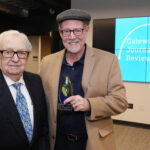First Amendment Celebration, Media News, Midwest
Baron no longer is confident a free press can endure, but he won’t declare war on Trump and clings to optimism
Martin Baron no longer takes for granted that the “rule of law will prevail” or that “a free press.




